Search Results
Your Treatment Team
Oncologists and hematologists are specialists who treat persons with leukemia, lymphoma, myeloma, myelodysplastic syndromes and myeloproliferative diseases. Pediatric hematologist oncologists treat children, adolescents and some young adults who have blood cancers. The oncologist or hematologist-oncologist coordinates a treatment and follow-up plan that involves other doctors as well as nurses, social workers, case managers and nutritionists.
Talking with Family, Friends and Children
Many people find it best to be honest with family and friends. By confiding in loved ones, you give them the chance to offer their support. It's true that some of your relatives or friends may not know what to say or do. But most do want to be supportive.
Consider "appointing" a willing family member or friend to be your "press secretary." He or she can be responsible for regularly letting others know your health status so you can focus on your treatment and recovery.
Possible Treatment Effects
Possible effects on spermSperm is made and stored in the testes. Sperm production begins at the onset of puberty and continues throughout the person’s life, although the amount and quality of sperm can naturally decrease with age. Cancer treatment can cause:
Childhood Blood Cancer
Hearing that your child has cancer is terrifying. Today, however, most childhood blood cancer patients can expect to have full and productive lives. Thanks to new and improved therapies, survival rates for childhood blood cancer have improved significantly over the past several decades. In addition, doctors, nurses and researchers continue to search for the causes of childhood leukemia and lymphoma to develop even better treatments and tailor therapies to decrease toxic side effects.
Fertility
People in the YA age group can be in many different stages of life. You may have children; you may want children in the future; you may not want children now, but may change your mind; or you may not have given it much thought at all. Cancer treatment can affect fertility in both women and men making it difficult to conceive a child in the future. A cancer diagnosis may require you to think seriously about children.
Not all cancer treatments affect fertility. Your risk depends on several factors, including
The International Prognostic Scoring System
Specific factors may affect the prognosis (likely outcome) of MDS, and help doctors determine when to start treatment and how intensive the treatment should be. These factors include:
Coping Tips for Parents
Throughout your child's illness, you'll be focused on comforting your child and helping him or her cooperate with treatment. You may also need to explain what's happening to your other children, answer relatives' questions and perhaps make alternate arrangements for work and childcare. All along the way, you'll be coming to terms with your own feelings and choices.
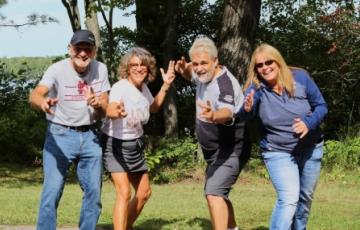
Paul & Lynn
In 2017, after 44 years of working in the railroad industry, Paul Sauter was just starting to enjoy his retirement, when his health started to decline out of nowhere. Typically, he was in extremely good shape and enjoyed long hikes with his wife, Lynn. One day, while on a mountain climb trip in Arizona, Lynn was concerned when she noticed Paul was not his usual athletic self. When he was unable to get out of bed because of severe back pain, she knew something wasn’t right.
Jarvis
In the fall of 2019, life was very active for me and my 4-year-old son Jarvis. I was busy working 2-3 jobs, and Jarvis was busy just being a kid. Almost every day after school we would go to the park so he could run around and play. He was even starting to get interested in bikes and wanting to learn to ride when he started to mention his feet were hurting.
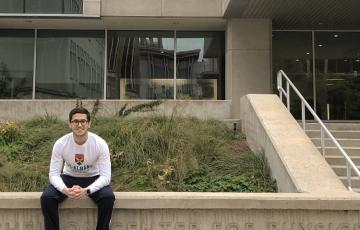
Jonathan
I was diagnosed with B-cell acute lymphoblastic leukemia (ALL) on July 26, 2019, and even without the involvement of a pandemic, I imagine that’s reason enough to believe that to me 2018 seems like a lifetime ago. Still, I can remember it well enough: A wide-eyed younger version of me arrived at college orientation, somehow simultaneously thrilled to begin a new chapter of his life and paralyzingly terrified of the imminent unknown.
Brent
My nephew Brent Terence was a perfectly healthy 17-year-old young man, active in school, up-to-date on his routine check-ups, and had normal labs. But until the end of July 2022, Terence showed signs of extreme fatigue, confusion, loss of memory, hallucination, and an inability to keep his eyes open and walk straight. So his parents, Brenda and Tristan, decided to take him to the ER. Multiple blood tests and X-rays were done, but they couldn’t figure it out.
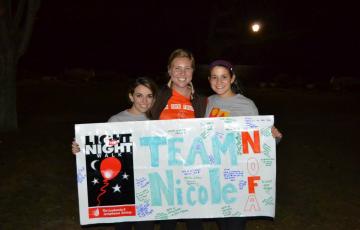
Nicole
Just two weeks into my junior year of high school, I was pulled out of class at lunch and packed a small overnight bag, not realizing I wouldn’t return to school for the entire year.
My name is Nicole, and in 2022, I celebrated the 10-year anniversary of that life-altering day.
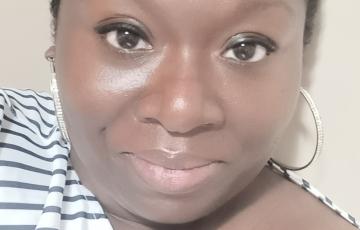
Jennifer
On New Year's Day 2012, I was diagnosed with acute myeloid leukemia (AML). I watched the ball drop in the ICU with a nurse assigned to me. They heard my mom being asked if I needed to be resuscitated, so they proceeded with that and then to hear her respond to do everything you can for her. The seriousness of that is very overwhelming.

Chancez
Hey, my name is Chancez (ironically, I was blessed with many chances last year). I became a part of The Leukemia & Lymphoma Society (LLS) community last year and was provided financial support. I was also presented with love, care, and daily reminders of all the support that was available to me to get me through such a rough period in my life. A friend of mine suggested that I share my story to help others in our community, especially young adults who are in the same predicament I was once in.
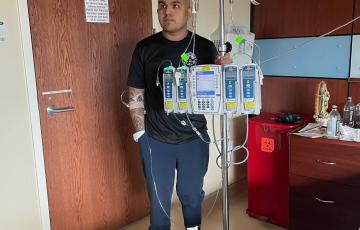
Santino
I know the pain of being told that you have cancer twice, but I also know the joy of being told that you have beaten cancer twice. I write this message to bring encouragement and to instill a fight in people who have had a relapse of cancer. Being told once that you have this disease is already heartbreaking, but to be told that it came back and you will need chemo again is soul-crushing.

Russ
Shockingly I was diagnosed with acute myeloid leukemia (AML) on February 28, 2024! My wife Nancy and I were devastated and had zero background or experience with leukemia. We were sent to UCLA for treatment. What a godsend!
Diagnosis
Diagnosing hairy cell leukemia usually involves a series of tests, including blood tests and bone marrow tests.
Treatment
It's important that your doctor is experienced in treating patients with myeloma or works in consultation with a myeloma specialist. This type of specialist is usually called a hematologist oncologist.
Types of Treatment for MyelomaYour treatment may include one or more of the following therapies:
Finding a Clinical Trial
If you're interested in the possibility of a clinical trial as a treatment option, talk with your doctor first. He or she can help you find an eligible trial.
Communicating With Your Partner
Discussing experiences, feelings and concerns with your partner(s)—giving each other the chance to talk and listen—is an important part of maintaining or improving your quality of life. Your partner may have his or her own concerns, such as being afraid of hurting you during sex, feeling guilty or selfish for wanting to be intimate with you or not knowing how to talk about their feelings. You may also want to talk about seeking help from a professional, such as a couples counselor or sex therapist.
Diet Guidelines For Immunosuppressed Patients
Food safety is important during and after cancer treatments. The immune system is often weakened by cancer treatments, making the body more susceptible to foodborne illnesses.
Neutropenia is a condition where you have lower-than-normal levels of neutrophils (a type of white cell). If you have neutropenia, following food safety guidelines are especially important. Be sure to follow all food handling guidelines to help protect you from bacteria and other harmful organisms found in some mishandled food and beverages.
Diagnosis
An accurate diagnosis of the type of leukemia is important. The exact diagnosis helps the doctor to estimate how the disease will progress and determine the appropriate treatment
Diagnosing acute myeloid leukemia (AML) and your AML subtype usually involves a series of tests. Some of these tests may be repeated during and after therapy to measure the effects of treatment.
Radiation Therapy
Radiation therapy, also known as “radiotherapy,” uses high energy x-rays or other types of radiation to kill cancer cells. While most blood cancers cannot be cured with radiation therapy alone, it may be combined other treatments such as chemotherapy, immunotherapy and stem cell transplantation. Radiation therapy may also be used to relieve symptoms of blood cancer and improve quality of life. For example, radiation therapy may be used to shrink an enlarged spleen, liver or lymph nodes. It may also be used to manage bone pain caused by cancer cells growing in the bone marrow.
Healthy Eating
People living with cancer may have different nutrition goals and challenges, depending on their: